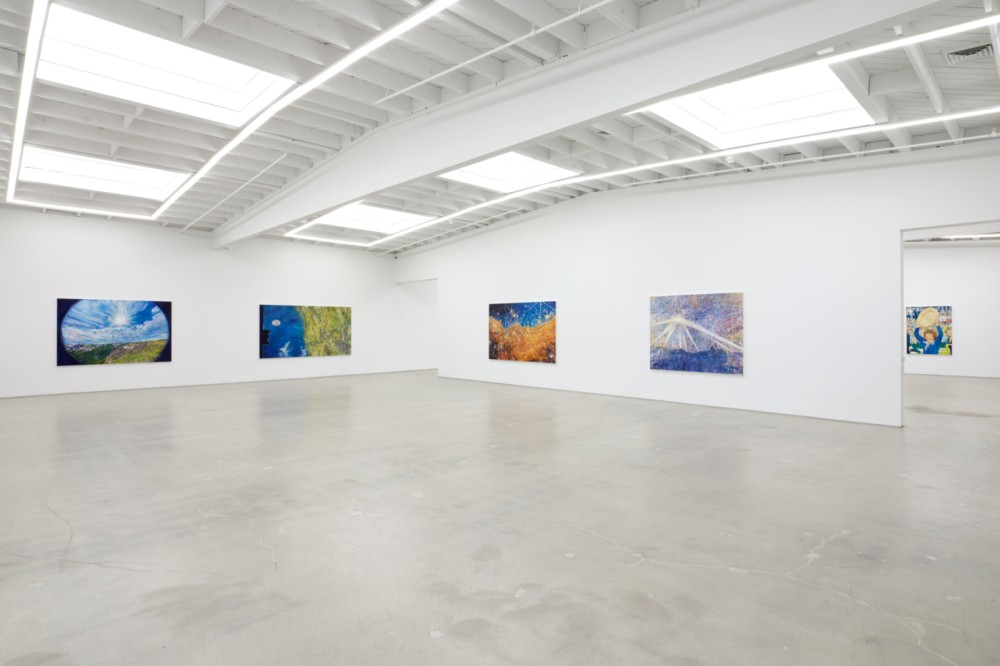
Keith Mayerson My American Dream: City of Angels
Mayerson’s sprawling, non-linear narrative painting series My American Dream (2000– ) weaves hundreds of discrete images from his personal life, popular culture, and the national landscape into a portrait of America as he sees it, full of potentiality. City of Angels, Mayerson’s latest chapter in the series, addresses his personal national imaginary, honing in on Los Angeles, the city where he came into his own as an artist in the 1990s and one that he has, since returning from New York in 2016, once again come to call home. The exhibition’s two rooms—the first an homage to the figures who are central to the artist’s California mythology, the second a meditation on the changing landscape of the American West—together comprise Mayerson’s tribute to the state’s utopian promise.
As Roberta Smith has written, each of Mayerson’s works “stands alone as a painted image” even as they are “part of a larger narrative.” City of Angels opens with a room of figurative oil-on-linen paintings, based, as all of Mayerson’s representational works, on photographs. The first depicts tennis legend Billie Jean King, who was born in Long Beach, holding up a trophy after winning Wimbledon in 1975, while the second shows Jim Henson surrounded by Muppets. As a student in Brown University’s semiotics department in the late-1980s, Mayerson learned about the signifying powers of pop-cultural and historical images; in addition to engaging in a postmodern deconstruction of their meanings, his work amounts to a sincere attachment to the emancipation they can represent. In King, he sees a feminist icon, while in the Muppets, who reappear across his oeuvre as a cipher for queerness, he perceives a diverse cast of characters who are celebrated for their deviation from the norm, here represented by Henson’s own human visage. Mickey, My Sister and Me (2023), based on a photo of Mayerson, age six, staring lovingly up at a costumed Mickey Mouse at Disney World in 1971 when it first opened (here, the Florida site is a stand-in for its California counterpart, Disneyland), returns to his childhood vision of Los Angeles as a city where creative individuals could build alternate worlds; its orange-and-blue palette evokes the hazy filter of a 1970s film camera. Cheech and Chong and Skateboarder (both 2023) tap into the city’s ’70s counterculture, disseminated as it was throughout the country and beyond via magazines, posters, and films that promised an alternative bohemian ideology and occasionally homosocial lifestyle.
Mayerson’s Southern California landscapes vibrate with intense emotion on the fault line between abstraction and representation. The son of a psychoanalyst, Mayerson is inspired by Surrealist and Modernist allegiances to the unconscious; in his abstractions of nature into visionary scenes, he draws from Symbolism as well as the work of Paul Cézanne, the Hudson River and Taos schools, and other regional American landscape painters. In the over-eight-foot-wide LA from a Plane (2023), he represents a city, as critical theorist Jean Baudrillard wrote in America, that is “in love with its limitless horizontality.” Mayerson’s use of a technique he calls “micro-management,” in which he paints each pixel of the original photograph as if it were a real entity, lends the landscapes a hallucinatory quality. Looking down on the city from above, the viewer is welcomed into its teeming fabric. In Sunset at Seal Rock, Laguna Beach, California (2023), a testament to Mayerson’s love for his husband, whom he first met in the small coastal city, the sky is striated like a slice of agate, each swirling layer of atmosphere a sky unto itself. With Joshua Tree (2024), the darker extremes of the Californian environment are visible: one of the park’s legendary yucca lays on the desert floor, an omen of the threats of climate change. There is hope for the future, however, in this work—newly sprouting yucca dot the horizon.
City of Dreams concludes with paintings of famous UFO sightings that construct a science-fiction allegory for this very existential peril—environmental disaster—to our endurance as a species. Juxtaposed panoramically with Mayerson’s representations of national parks, these alien history paintings propose an alternate future for our planet in which a group of radical outsiders come to Earth to save it from climate catastrophe. He renders The Phoenix Lights: Still from a video taken by Mike Krystone, 10 pm, March 13, 1997 (2024) as luminous yellow blocks standing out from a Klimt-like field of purple and blue shapes that form a sumptuous mosaic in which landscape and sky morph, overlap, and dissolve into each other. In USS Roosevelt ‘Gimbal UFO’: Still from the Declassified Jan. 2015 Video (2023) and Battle of Los Angeles, February 24/25, 1942 (2024), Mayerson’s painterly brushstrokes fill skies and mountains with hundreds of eyes channeled from the “noise” of the original photos, silently witnessing the arrival of sublime cosmic phenomena. Provoking a consideration of what will come of Los Angeles and of America more broadly, Mayerson sews together past and present into a visionary tapestry that insists the country is worthy of redemption.